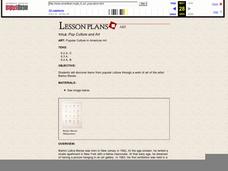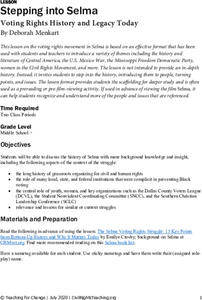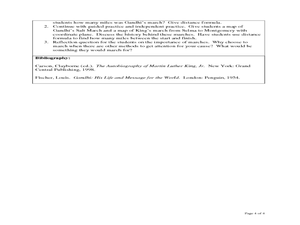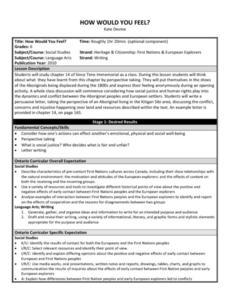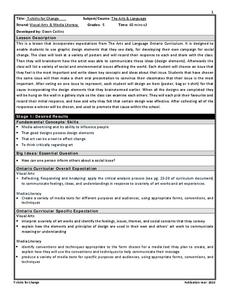Curated OER
How Did Slavery Impact Our Nation?
Fifth graders closely examine the effects of slavery on American society giving special emphasis to the issue of social injustice, the life of Harriet Tubman, the underground railroad and the achievements of Abraham Lincoln during this...
Curated OER
Pop Culture and Art
Learn about American pop culture, art, and the social voice that art can convey. The class discusses the life and art of Barton Benes, views his piece Reliquarium, then discusses what they see and feel when they view his work. Make sure...
Facing History and Ourselves
After Charlottesville: Contested History and the Fight against Bigotry
History doesn't always reflect all sides. Academics discover how the remembered history of the Civil War differs for White and African Americans. The instructional activity explores how Civil War monuments and celebrations have racist...
Learning for Justice
The Color of Law: Creating Racially Segregated Communities
It is pointed, powerful, and painful! The first of three lessons about laws and practices that support inequality looks at how government policies created and reinforced segregated communities. Young social scientists read excerpts from...
Anti-Defamation League
What are Reparations and Should We Enact Them?
Young social scientists investigate recent legislative proposals for reparations for African Americans. They examine the rationale behind the proposals by viewing videos and reading related articles. To close the lesson plan, scholars...
Annenberg Foundation
Poetry of Liberation
How do writers use words to protest injustice, challenge the status quo, and shape their own identities? Individuals watch and discuss a video, read author biographies, write poetry and journals, develop a slideshow, and complete a...
Teaching Tolerance
Dismantling Racial Caste
It's time to end racism. The final installment of the series encourages scholars to consider what is needed to ended the racial caste system in the U.S. Young historians complete group discussion, written prompt, and a hands-on-activity...
Facing History and Ourselves
Speaking Up and Speaking Out
The final lesson plan in the Standing Up for Democracy unit offers class members a way they can stand up and speak out by crafting spoken word poetry, or Slam poetry. After analyzing several examples, individuals reflect on one positive...
Teaching Tolerance
Parallels Between Mass Incarceration and Jim Crow
Is history repeating itself? A riveting lesson examines the parallels between mass incarceration in the U.S. and the Jim Crow Laws of the past. Academics review Jim Crow Laws and compare them to mass incarcerations of African Americans....
Teaching for Change
Stepping into Selma
The 1964 Selma to Montgomery, Alabama voting rights marches are the focus of a lesson designed to introduce learners to people who took part in the Civil Rights Movement. Class members set into the role of one of the participants,...
Teaching Tolerance
Introducing 'The New Jim Crow'
When Jim Crow Laws ended, the intent behind them did not. Academics read "The New Jim Crow Laws" and an interview from the author to understand how racism has not ended, but rather changed over time. The lesson explains how prejudices in...
Teaching Tolerance
Persuasive Letters
Sharpen persuasive writing skills while trying to solve a community problem. Learners choose a burning topic and then write letters to persuade others to come around to their views. The provided procedures walk through how to guide the...
Facing History and Ourselves
Kristallnacht: Decision-Making in Times of Injustice
Have you ever been singled out in a crowd before? Pupils investigate and analyze the events of the Holocaust. They dive into the life of a middle school student, as well as the diary entries of those in Kristallnacht during World War II.
Curated OER
The Distance Formula and Marching Nonviolently for Social Change
Students explore the distance formula using real world data from nonviolent marches for social change. In this secondary mathematics lesson, students investigate the marches of Gandhi and King using maps overlaid with a coordinate...
Curated OER
How Would You Feel?
Sixth graders put themselves in the shoes of aborigines who were displaced from their homes in the 1800s by Europeans who came in and took their land from them. They discuss the social injustices suffered by these people, and write a...
Curated OER
T-shirts for Change
Can school children change the world? With a social or environmental issue in mind, 5th graders use what they know about advertising media to make t-shirts that have something to say. They research the issue they'd like to focus on,...
Curated OER
Injustice on our Plates
Students investigate boycott as a way to stand up and fight injustice. In this Teaching Tolerance instructional activity, students research consumer boycott movements and write about their impressions.
Curated OER
Social Boundaries Activity: Map It Out
Learners observe the school for one week to identify social boundaries. In this map it out activity, students sketch the school's social boundaries, identifying where social cliques hang out. Learners compare their viewpoints and...
Facing History and Ourselves
Tactics of Nonviolence
Students analyze the direct action tactics of nonviolence. As a class, they distinguish between a strategy and a tactic and identify tactics used during the civil rights movement. They relate these tactics and how they might be used to...
Stanford University
Letter from Birmingham Jail: The Power of Nonviolent Direct Action
What strategies are most effective in changing an unjust law? Class members examine the tactics used in the Birmingham Campaign of 1963 (Project C) to achieve social justice and social transformation. After examining documents that...
Anti-Defamation League
8 Ideas for Teaching National Hispanic Heritage Month
Here are eight ideas to celebrate National Hispanic Month! Scholars have the opportunity to read and discuss literature, include people and events in history, examine art, watch and discuss films, listen to and dance to music, explore...
Curated OER
Social Protections and the European Union
Sixth graders take on the role of social welfare systems in the European Union. In this European Union (EU) lesson, 6th graders discover social programs in the EU and compare them to the social programs in the United States.
Curated OER
Angelina and Sarah Grimke: Sisters of Social Reform
Young scholars read about Angelina and Sarah Grimke and answer comprehension questions about them. In this women of social reform lesson plan, students read about women who helped to abolish slavery, discuss having goals and ambitions,...
Curated OER
Justice and Kindness Play a Part: King Day
Students recognize injustice in the world. In this social justice lesson, students discuss the responsibility they have to be advocates for justice and kindness and identify a time when they felt they were treated unfairly.
Other popular searches
- Immigration Social Injustice
- Social Injustice Poems
- Social Injustice 5th Grade
- Causes and Social Injustice
- Social Injustice Poetry
- Social Injustice Fold Able
- Social Injustice New Zealand
- Social Injustice Drama
- Social Injustice Role Play
- Lists of Social Injustices
- Social Injustice Foldable
- Social Injustice New Zeal And



